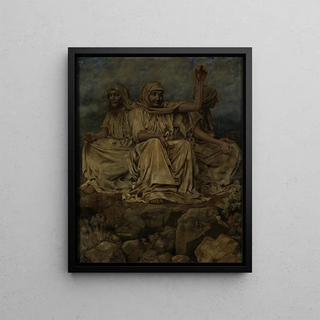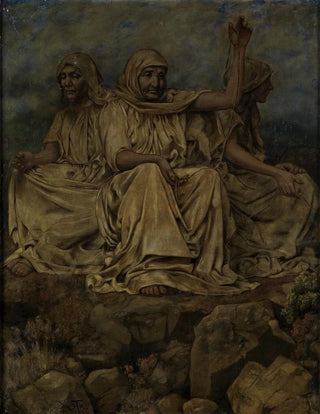Art print | The Norns - Hans Thoma


View from behind

Frame (optional)
In the vibrant universe of art, some works stand out for their ability to capture the collective imagination. "The Norns" by Hans Thoma is one of those creations that, through its narrative richness and symbolic depth, invites the viewer to immerse themselves in a world where mystery and poetry intertwine. This piece, emblematic of the symbolist movement, evokes universal themes such as destiny, life, and death, which continue to resonate through the ages. By contemplating this art print, one is immediately transported into a dreamlike universe where mythological figures blend with nature, creating an atmosphere that is both fascinating and unsettling.
Style and uniqueness of the work
Hans Thoma's style in "The Norns" is characterized by delicacy and finesse of treatment that reflect his attachment to nature and mythology. The Norns, these three sisters from Norse mythology, are depicted with an ethereal grace, their gestures and expressions betraying ancient wisdom. The color palette, subtle and harmonious, plays a crucial role in the atmosphere of the piece. Soft tones and delicate nuances give the scene an almost mystical dimension, while the meticulous details of the characters' clothing and hair reveal the artist's concern for realism. Thoma thus manages to create a perfect balance between abstraction and figuration, offering the viewer an immersive and poetic visual experience.
The artist and his influence
Hans Thoma, born in 1839 in Germany, was a painter whose work was marked by a deep connection to mythology and nature. Influenced by Romanticism and symbolism, Thoma sought to express deep emotions and ideas through his paintings. His unique style, which combines realism and dreamlike elements, allowed him to carve out a prominent place in the artistic landscape of his time. By incorporating folk themes and references to popular culture, he was able to reach a broad audience, while inspiring many contemporary and future artists. The Norns, in particular, reflect

Matte finish

View from behind

Frame (optional)
In the vibrant universe of art, some works stand out for their ability to capture the collective imagination. "The Norns" by Hans Thoma is one of those creations that, through its narrative richness and symbolic depth, invites the viewer to immerse themselves in a world where mystery and poetry intertwine. This piece, emblematic of the symbolist movement, evokes universal themes such as destiny, life, and death, which continue to resonate through the ages. By contemplating this art print, one is immediately transported into a dreamlike universe where mythological figures blend with nature, creating an atmosphere that is both fascinating and unsettling.
Style and uniqueness of the work
Hans Thoma's style in "The Norns" is characterized by delicacy and finesse of treatment that reflect his attachment to nature and mythology. The Norns, these three sisters from Norse mythology, are depicted with an ethereal grace, their gestures and expressions betraying ancient wisdom. The color palette, subtle and harmonious, plays a crucial role in the atmosphere of the piece. Soft tones and delicate nuances give the scene an almost mystical dimension, while the meticulous details of the characters' clothing and hair reveal the artist's concern for realism. Thoma thus manages to create a perfect balance between abstraction and figuration, offering the viewer an immersive and poetic visual experience.
The artist and his influence
Hans Thoma, born in 1839 in Germany, was a painter whose work was marked by a deep connection to mythology and nature. Influenced by Romanticism and symbolism, Thoma sought to express deep emotions and ideas through his paintings. His unique style, which combines realism and dreamlike elements, allowed him to carve out a prominent place in the artistic landscape of his time. By incorporating folk themes and references to popular culture, he was able to reach a broad audience, while inspiring many contemporary and future artists. The Norns, in particular, reflect






